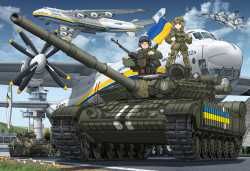[93 / 1 / 30]
https://www.axios.com/2022/12/24/nato-united-ukraine-arms-zelensky
Ten months after Vladimir Putin invaded Ukraine, the West remains united in its staggering support for Ukraine.
The big picture: Neither the sheer scale of the global response, nor the West's ability to maintain it, seemed inevitable — or even likely — when the invasion began. But the support for Ukraine has changed the course of that war and sent a signal that the West may be more united overall than some experts believed.
What they're saying: "If anybody had told you in January that Europe as a whole, led by Germany, would be doing everything they can to cut fossil fuel dependence on Russia, you'd have said they were crazy," said Ivo Daalder, a former U.S. ambassador to NATO. "And yet, that's what they're doing."
Arms shipments to Ukraine over the year are without precedent, at least since World War II — and they're still increasing.
>Volodymyr Zelensky’s visit to Washington was largely a lovefest. And when Biden was asked about Western unity fraying in 2023, he replied he was "not at all worried."
Flashback: The West responded to the 2014 annexation of Crimea with sanctions. But their effects were manageable for the Kremlin. Germany — which relied on Moscow for more than 50% of its gas — maintained close economic links with Russia.
>And right up until Putin made his move in February, many of NATO's biggest powers cast doubt on U.S. intelligence about a looming invasion.
But once the invasion came, the response was far swifter and stronger than even most in the alliance would have predicted.
>"The countries that had been most wary of offending Putin, basically, were shocked into responding in the way they did," Daalder said. "And that includes, first and foremost, Germany.”
Ten months after Vladimir Putin invaded Ukraine, the West remains united in its staggering support for Ukraine.
The big picture: Neither the sheer scale of the global response, nor the West's ability to maintain it, seemed inevitable — or even likely — when the invasion began. But the support for Ukraine has changed the course of that war and sent a signal that the West may be more united overall than some experts believed.
What they're saying: "If anybody had told you in January that Europe as a whole, led by Germany, would be doing everything they can to cut fossil fuel dependence on Russia, you'd have said they were crazy," said Ivo Daalder, a former U.S. ambassador to NATO. "And yet, that's what they're doing."
Arms shipments to Ukraine over the year are without precedent, at least since World War II — and they're still increasing.
>Volodymyr Zelensky’s visit to Washington was largely a lovefest. And when Biden was asked about Western unity fraying in 2023, he replied he was "not at all worried."
Flashback: The West responded to the 2014 annexation of Crimea with sanctions. But their effects were manageable for the Kremlin. Germany — which relied on Moscow for more than 50% of its gas — maintained close economic links with Russia.
>And right up until Putin made his move in February, many of NATO's biggest powers cast doubt on U.S. intelligence about a looming invasion.
But once the invasion came, the response was far swifter and stronger than even most in the alliance would have predicted.
>"The countries that had been most wary of offending Putin, basically, were shocked into responding in the way they did," Daalder said. "And that includes, first and foremost, Germany.”

